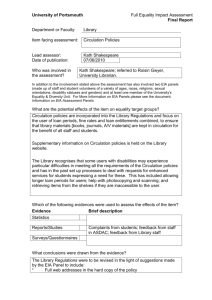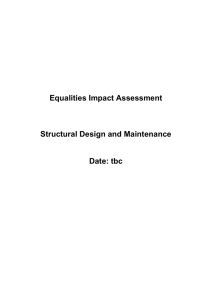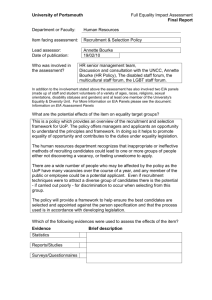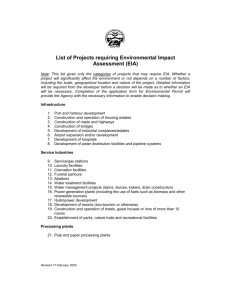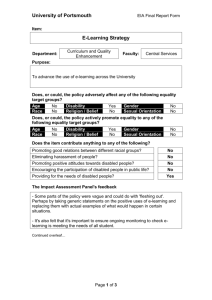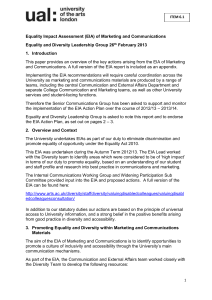Equality Impact Assessment Programme: A New Road Map
advertisement
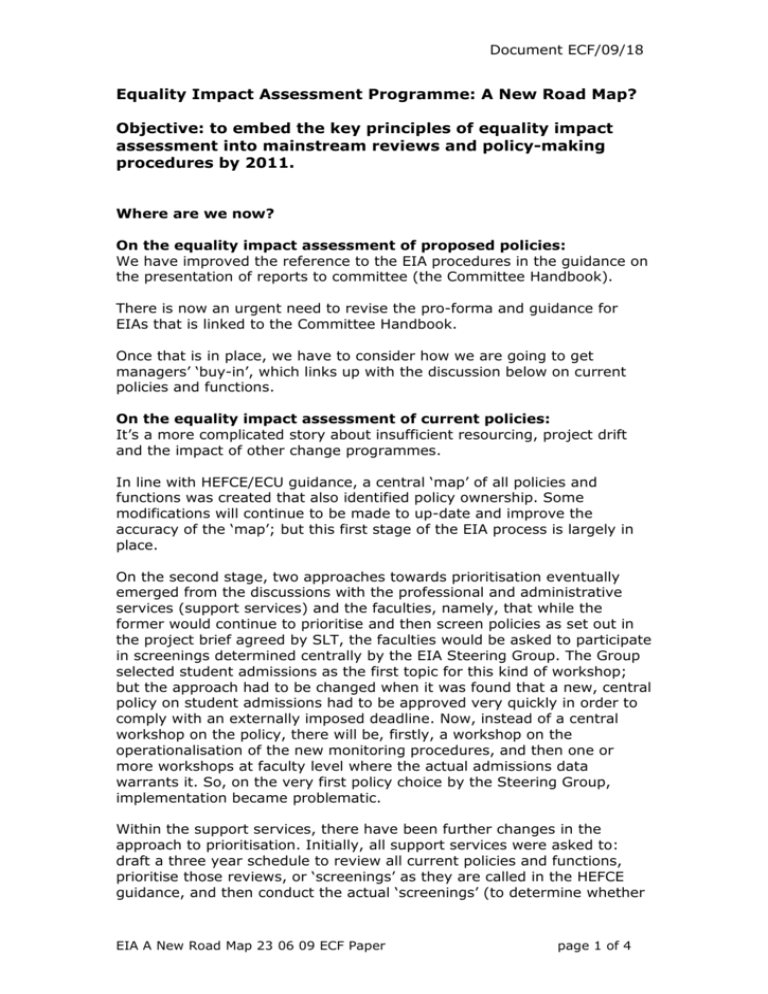
Document ECF/09/18 Equality Impact Assessment Programme: A New Road Map? Objective: to embed the key principles of equality impact assessment into mainstream reviews and policy-making procedures by 2011. Where are we now? On the equality impact assessment of proposed policies: We have improved the reference to the EIA procedures in the guidance on the presentation of reports to committee (the Committee Handbook). There is now an urgent need to revise the pro-forma and guidance for EIAs that is linked to the Committee Handbook. Once that is in place, we have to consider how we are going to get managers’ ‘buy-in’, which links up with the discussion below on current policies and functions. On the equality impact assessment of current policies: It’s a more complicated story about insufficient resourcing, project drift and the impact of other change programmes. In line with HEFCE/ECU guidance, a central ‘map’ of all policies and functions was created that also identified policy ownership. Some modifications will continue to be made to up-date and improve the accuracy of the ‘map’; but this first stage of the EIA process is largely in place. On the second stage, two approaches towards prioritisation eventually emerged from the discussions with the professional and administrative services (support services) and the faculties, namely, that while the former would continue to prioritise and then screen policies as set out in the project brief agreed by SLT, the faculties would be asked to participate in screenings determined centrally by the EIA Steering Group. The Group selected student admissions as the first topic for this kind of workshop; but the approach had to be changed when it was found that a new, central policy on student admissions had to be approved very quickly in order to comply with an externally imposed deadline. Now, instead of a central workshop on the policy, there will be, firstly, a workshop on the operationalisation of the new monitoring procedures, and then one or more workshops at faculty level where the actual admissions data warrants it. So, on the very first policy choice by the Steering Group, implementation became problematic. Within the support services, there have been further changes in the approach to prioritisation. Initially, all support services were asked to: draft a three year schedule to review all current policies and functions, prioritise those reviews, or ‘screenings’ as they are called in the HEFCE guidance, and then conduct the actual ‘screenings’ (to determine whether EIA A New Road Map 23 06 09 ECF Paper page 1 of 4 Document ECF/09/18 a much more detailed enquiry, a ‘full impact assessment’ in other words, would be necessary). However, broadly two responses emerged from within the support services to that guidance: (a) some either agreed to the approach in principle, or have actually drawn up a 3 year schedule (Estates, ILS, Finance, PVC Research & Innovation); or (b) they decided to build EIA into their review processes in one way or another (HR, GSU, Commercial Services and PVC Academic) and not have a separate schedule for screenings. So far, few screenings have actually taken place. In GSU, five academic policies (reviewed by Pinsent Masons) have been screened, using the present template. Initially, they were disappointing; but there were also some very positive developments. A kind of EIA was carried out on the draft student admissions policy, and although that, too, had positive outcomes, the template itself was not actually used. The PVC Research & Innovation led an introductory workshop for RIDs and ADs on screening, which, again, had a positive outcome without the template being completed. While discussions are continuing with Estates, Finance, ILS, HR and SID, Student Life (SL) is the only directorate that has a firm schedule to screen any policies before the end of July. For most of these services, the principal reason for delay is the impact of Project Headroom and the restructuring of the support services. In addition, the EIA Project Team has not even been able to initiate discussions with the other support services (Enterprise & Development) because of the lack of staff resources within GSU. Overall, these results are disappointing compared to the original intention – agreed by SLT in October 2008 – that all units, both academic and non-academic, should have had some engagement in screenings before the end of July 2009. As indicated earlier, some of the causes of this relatively disappointing outcome – the limited staff resources and the restructuring of the support services – were outside the control of the EIA Project Team. However, while the Team did its best to firm up its approach with a project plan, it could not cope with the diversity of approaches that emerged from the dialogue with the senior managers and the volume of policy and procedural reviews that are taking place across the University. The Team attempted to respond to these issues, and others, by refining the project plan and drafting a ‘risks and issues’ log; but it was unable to present a clear set of solutions to the Steering Group. There is clearly a need for both a new ‘road map’ for the programme and additional resources (at least for the next two years). Such a ‘map’ should also take into account the Government’s latest statements on how they see equality impact assessments being conducted under the new Equality Duty from 2011 onwards. (See the section on impact assessments in the EIA A New Road Map 23 06 09 ECF Paper page 2 of 4 Document ECF/09/18 consultative draft on the specific duties, which proposes a ‘light touch’ approach that focuses on ‘key policies’ and outcomes rather than processes. http://www.equalities.gov.uk/pdf/Specific%20Duties%20Consul tation%20Document.pdf ) Proposals for the new road map: First, it is recommended that we proceed with the existing programme of activities. This should include: SL’s workshops, an equality awareness workshop for Estates, the meeting of the research community, any workshops organised by ILS and HR, any workshops around student admissions, and, lastly, the workshop on public procurement (now scheduled for September). (See annex 1 for further details.) The second recommendation is that faculties should be involved through any workshops organised by the support services that have a direct relevance to activities in the faculties. It may be too late to do this in the case of SL’s forthcoming workshop on academic skills; but it should be considered as the other support services begin to plan their workshops. Otherwise, we have to ask whether a new approach to the involvement of the faculties and schools has to be developed. The third recommendation is that we re-launch the programme when the EIA Co-ordinator is in post. Working alongside the Senior Assistant Secretary (Equality & Diversity), this officer should have the clear brief to frame a project that aims at mainstreaming equality impact assessments into all review and policy-making procedures by 2011 (that fully complies with specific duties as re-defined in the forthcoming Equality Act), with these specific outcomes: a ‘map’ of all review processes and programmes (both routine and ad-hoc) a new template and guidance that responds to local feedback and the Government’s draft guidance on impact assessments a protocol on consultation and engagement with key stakeholders a central log that records the progress of all EIAs a web site that enables impact assessment and promotes the resulting improvements Report Writer: Dr Ken Grainger Senior Assistant Secretary, Equality & Diversity Governance Services Unit 23rd June 2009 EIA A New Road Map 23 06 09 ECF Paper page 3 of 4 Document ECF/09/18 Annex 1: Current schedule of activities around the Equality Impact Assessment Programme Organisation Student Life Human Resources Estates & Property Services Activity Date Workshop on health and counselling services Workshop on academic skills programmes 1st July Allocation of lead responsibilities for the reviews of the top ten HR policies and prioritisation for the screening workshops First screening workshops completed 12th July Initial workshop to raise awareness of equality and diversity issues Dates pending completion of structuring Date pending Date pending Screening workshop on car parking Screening workshop on work experience placement in the Division 21st July By 7th August Information & Learning Services Completion of review of Division’s process catalogue By 31st July Finance Workshop on procurement 30th September PVC Academic [possibly in conjunction with: Student Information/ Planning & Performance] Workshop on operationalising the new policy on monitoring admissions By end of July Faculty-based workshops where admissions data indicate the need By end of September EIA A New Road Map 23 06 09 ECF Paper page 4 of 4
